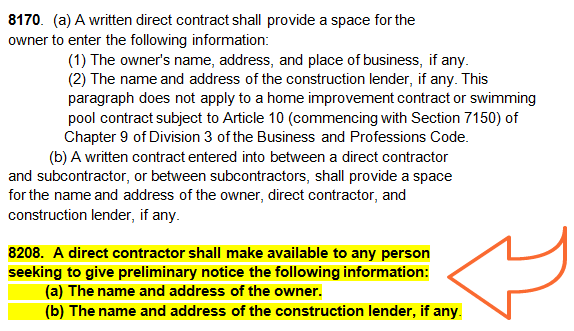California Lender Search: a Best Practice
A customer contacted NCS with the following conundrum:
“I have an $800,000.00 private project in California. My customer returned the completed Job Information Sheet and the lender spot was marked with “no lender-owner financed”. I know the lender has to receive a copy of the preliminary notice, is this proof that there is no lender?”
Since the client took steps to obtain the project information, including the ladder of supply, is the job information sheet “proof” that he performed the due diligence necessary to secure lien rights?
As you know, I am not an attorney, so I sought a legal opinion from an attorney in our national network:
“… as of right now, there is no case law as to whether or not you can assume the information you are provided is correct as to there being no lender on a project. Creditors should always perform a search to confirm whether or not there is a construction loan on the project.”
The attorney added that prior to the July 2012 revisions to the California statute, case law indicated that due diligence for obtaining lender information included checking the building permit and checking for a construction loan.
However, current statute says lack of information on the building permit does not relieve the requirement to serve the lender, and also, even though a loan may not be labeled as a construction trust deed, you still have to notify the lender.
NCS Best Practice
Perform formal searches on any party required to receive a copy of a notice. (This goes for liens/bond claims too – you should always confirm the parties within the ladder of supply.) Many attorneys & organizations, like NCS, provide research/investigative services – in fact, we offer a Lender Search specifically.
Not interested in paying a provider to obtain the information for you?
The DIY Best Practice
Contact the GC. According to California statute, the information should be provided in the contract and the GC must provide the name and address for the owner and lender:

Bottom Line: Seek legal guidance and always perform the search – better safe than sorry!


